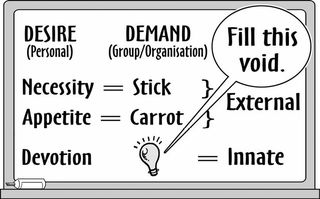For several weeks I have been involved in and following conversations on LinkedIn about motivating employees and accountability. Judging from the number of contributions these are hot topics and cause serious concern.
They also seem to be subjects that cause some confusion.
Personally, I find it very disturbing that there are people who continue to think that it is a manager’s responsibility to motivate his employees and so are looking for a magic formula to deliver this. I would have thought there was more than enough evidence that motivation is innate and therefore requires intrinsic rather extrinsic stimulation. Of course, this means a manager’s role is to inspire and enable rather than to motivate. Unfortunately the vestiges of old school management with its command and control style seem very hard to shake off.
It was therefore a great pleasure this morning to once again listen to Dan Pink. Man, he does talk sense!
Of course it is always easier to think someone yet is talking sense when what they say mirrors much of your own thinking. But Pink supports what he says with empirical evidence.
Thus when he says, “there is a mismatch between what science knows and what business does” you have to listen. It is a real rallying call.
When he cites the 2009 London School of Economics study that “we find financial incentives can result in a negative impact on overall performance” he demolishes the entire case for incentivising people and the performance related pay ethos that has done so much to destroy the economy. However, he does not leave it there: he also gives you the new scientific framework, which is built on three elements:-
• Autonomy – the urge to direct our own lives;
• Mastery – the desire to get better and better; and
• Purpose – the desire to do what you do in the service of something bigger than yourself.
You shouldn’t find this at all surprising. After all, if you think about it, this is simply embracing more of Maslow’s hierarchy of needs.
And you don’t have to look very far to find out how to go about creating this. The framework that I have developed for employee ownership fills the gap identified in the illustration above from my book, "Lean Organisations Need FAT People." It offers all three in so far as:-
• Employee ownership creates a greater link between your personal and organisational life and so encourages greater autonomy.
• The goal of optimising your asset value to increase your stake in the business inspires you to better yourself and thus aligns the desire for personal mastery with the organisational equivalent – continuous improvement.
• The stake in the organisation engenders a greater sense of what the business is all about and so creates the sense of purpose for the business and hence builds the shared values that embed the sense of purpose that delivers an enhanced customer experience.
Can you not just imagine how this would transform your business and its performance and results? There is no magic formula but this could be the closest thing. So what are you waiting for?

